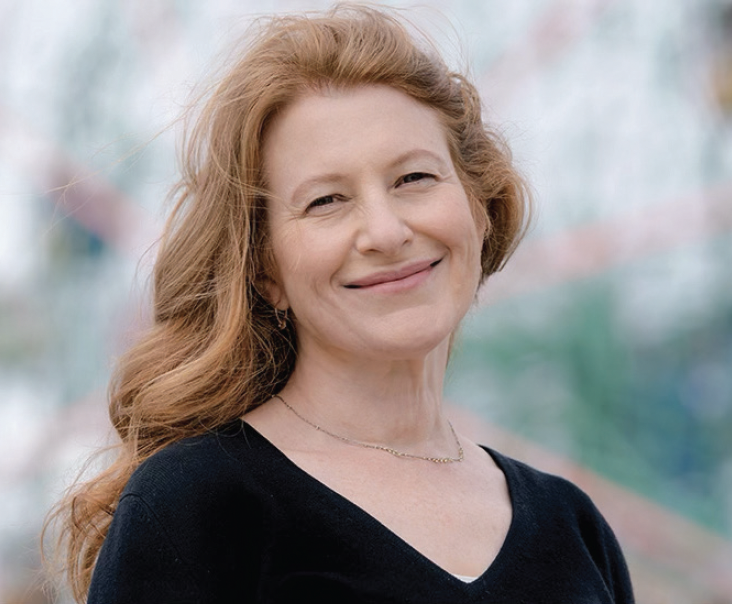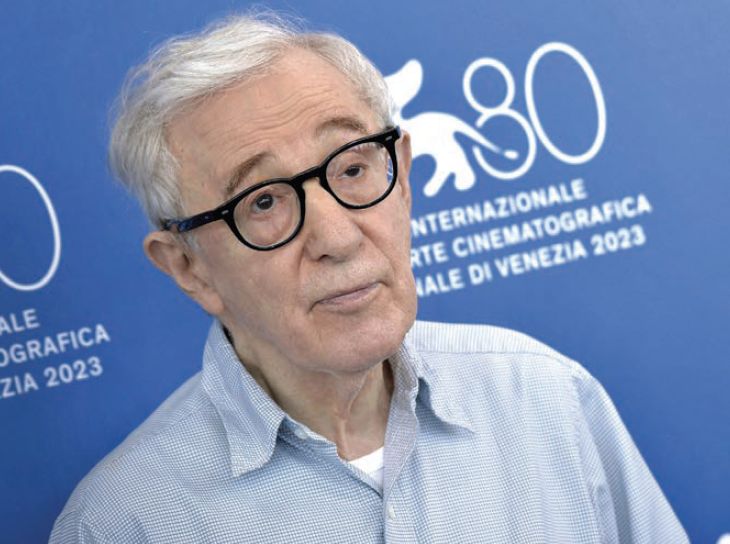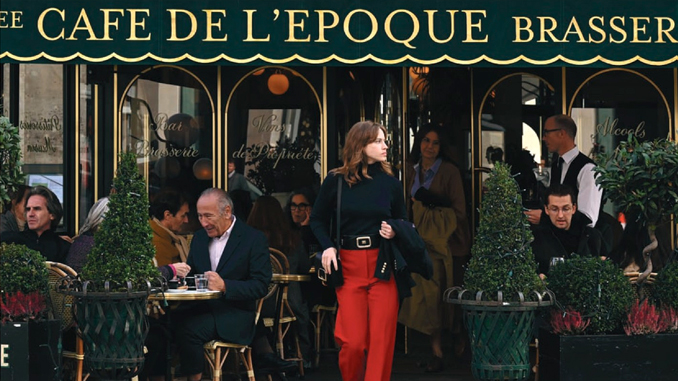By Rob Feld
Alisa Lepselter’s first feature editing credit was for Nicole Holofcener’s breakout “Walking and Talking,” but she was soon snatched up by Woody Allen to cut “Sweet and Lowdown,” and has been working for him nearly exclusively ever since.
Just this year, her availability realigned with Holofcener’s production schedule to collaborate with her on “You Hurt My Feelings,” before returning to cut Allen’s 50th feature film, “Coup de Chance,” his French-language suspense-drama. The film may or may not be Allen’s last—he has questioned his willingness to do the fundraising hustle at age 88—but Lepselter approached it no differently than usual.
The film tells the story of Fanny (Lou de Laâge), who had attended high school in New York but now lives in Paris. She runs into a novelist, Alain (Niels Schneider), who had been in love with her in high school and is writing his next book in Paris. Though Fanny is married to Jean (Melvil Poupaud), a wealthy and controlling finance titan, Alain pursues her and eventually draws her into an affair. Jean’s suspicions lead to a murder, leaving Fanny and her mother in danger.

Alisa Lepselter.
“In making a film, it is key to have a first-rate cinematographer and a first-rate editor,” Allen said. “I’ve always worked with only first-rate cinematographers and for many years with Alisa because she is a first-rate editor.” Lepselter’s skills and ability to collaborate with the exacting Allen are on display in the film, which moves quickly as a drama while balancing aspects but not fully following the form of a suspense thriller as closely as did their work on “Match Point.” Finding the voice of “Coup de Chance” took give and take and experimentation, and the trust born of years of collaboration.
CineMontage: Looking at the directors you have worked with—Woody Allen, Nicole Holofcener, and Nora Ephron while you were an assistant editor—there is a bit of a family tree there; not unrelated voices, but different personalities with whom to interact. Allen was one of the more pleasant interviews of my life, Eph-on perhaps the most challenging. Can you tell me about your collaborations?
Alisa Lepselter: I felt lucky enough to share a sensibility with a lot of the people I worked with. We clicked. We laughed at the same things. That’s a big part of it. I adored Nora and was so grateful to her for so many things. People would say to me, “I hope you get to be her editor someday.” But I would say, “Actually, I am much happier being her friend.” She was tough to work for because she was so demanding, so particular. I was glad that I got to see that, but not be the one who had to answer to it as her editor. But she did really encourage me a lot in my career.
CineMontage: Your first job as an editor was also Nicole Holofcener’s breakout feature, “Walking and Talking.” You were finally able to work with her again on “You Hurt My Feelings.” Did you find your collaborative process change over the years?
Lepselter: Nicole is one of my closest friends. I cut her first feature but unfortunately, we got out of sync after that. I wasn’t available when she made her second feature because I was working for Woody. So, it took us this long to be able to work together again. We speak the same language and I feel like I understand her scripts on a deep level. We’re contemporaries and we have a lot in common. I love the way she writes. When I first interviewed with her for “Walking and Talking,” I hadn’t cut a feature yet and the producers were too nervous to hire me. They said, “Nicole really loved you but she’s a first-time director and we feel that she needs someone with more experience.” But then they allowed her to hire me. She said, “I could tell that you get me,” because of the way that I spoke to her about her characters. I get her on a level very differentfrom the way I get Woody, but I understand where he’s coming from, too. I’d only cut “Walking and Talking” when I met him, but I think he trusted that I knew what I was doing, and he wanted someone who he felt comfortable sitting next to all day because he spends so much time in the editing room.
‘When we’re working it’s pretty intense.’
CineMontage: Tell me about your process with him. He’s not the personality you would imagine from seeing in his movies.
Lepselter: No, he’s very reserved. I think part of that comes from being so famous for so long that people think they know you. Our relationship is very professional. It’s all about the work. It’s not as though he doesn’t make me laugh because he does. He can’t help it. He’s one of the funniest people who ever lived, but when we’re working, it’s pretty intense. He likes to be there while we’re cutting the first pass. We always start with scene one and go through the film sequentially, assembling it together, looking at all the dailies and selecting takes. I’ll make notes as we screen the dailies and then I’ll put it together. He’s not far away while I’m doing that. With “Coup de Chance,” I had to have two scripts: a French and an English. I speak French as well as you could expect for someone who studied it a long time ago, so I felt comfortable enough with the language, reading it and listening to it, but I hired a French assistant, Hadrien Nicoloso, who could tell me if I made a mistake. If I thought that a cheat worked, I had Hadrien there to tell me whether or not it was something I could get away with; or if I unintentionally dropped a word or if a syllable got by me, or occasionally a flub in a line reading that I thought was acceptable. In a Woody film, the stammering that seems so natural isn’t something that I necessarily would cut around. But what seems like a natural stammer might actually be that the actor was just forgetting their line. That was new to the process but otherwise, we put together a first assembly, screen it on the big screen, make changes, and screen it over and over again until we feel it’s where it needs to be.

AUTEUR: Woody Allen at the 80th Venice International Film Festival 2023. PHOTO: ALAMY
CineMontage: What sort of coverage do you get from him and where does he put his focus when choosing a take?
Lepselter: He shoots limited coverage, and he doesn’t shoot a lot of takes because he knows what he wants. I think he directs efficiently. When deciding between takes, it’s almost always about performance, but it’s also about camera and the rhythm. There aren’t a ton of choices, but the actors will give you different performances. So, it’s about tone and how we feel the scene is best represented.
CineMontage: Have you seen his process or emphasis change over time?
Lepselter: He’s become more relaxed about certain things and more concerned about others. He’s certainly more trusting of me after working together for so many years. If we disagree on something, I’ll push him twice, not three times, because I feel like it’s my job to point out something when I don’t agree with him. But he’s the director. So, I have to find a way to get my point across. Now it’s nice to not feel like I have to work as hard for him to understand me. We have a much easier rapport so that if I am trying to convince him to look at something another way, he’s much more receptive to it. CineMontage: “Coup de Chance” has a suspense element but it doesn’t fully lean into the genre. Can you talk about how you found the tone? Lepselter: We find it as we go. This particular film was a little tricky because you want it to be suspenseful and to move quickly. But it is also a relationship drama that shouldn’t feel like a horror movie. That was something that we worked with a lot. The main character, Jean, had to be scary enough, but you don’t want him to be a monster. You want him to be a believable character. That was one of the more challenging aspects of this film: how to get the tone right for someone who is clearly a problematic character, while keeping him believable and not a cartoon.
CineMontage: Do you think that was more finding the performance or leaving moments out?
Lepselter: It was a combination of both. There were things that we left out that were too leading or too over the top. It was piring it down from some of the things that were on the page where, once we saw the whole, made it feel less believable.
CineMontage: He has said this will be his last film. Do you believe it or did that impact your approach to it?
Lepselter: I think he backtracked on that, and I don’t think that’s what he meant. I mean, it could conceivably be, but if something came along that he wanted to do, he wouldn’t say that he wouldn’t do it.
CineMontage: Having such an inside view, what do you think his contribution to film has been? What differentiates him?
Lepselter: He’s a distinctive filmmaker with such a specific style. Obviously, the fact that he’s made almost a film a year for so many years is a big part of it. I think the fact that he’s so prodigiously talented and prolific is an enormous contribution. Just the sheer number of different films that he’s made. Comedies obviously, but also dramas. The characters that he’s created have become some of the most important characters to film lovers everywhere. I grew up watching Woody Allen films. Never in a million years did I think I’d be lucky enough to work on one of them.


